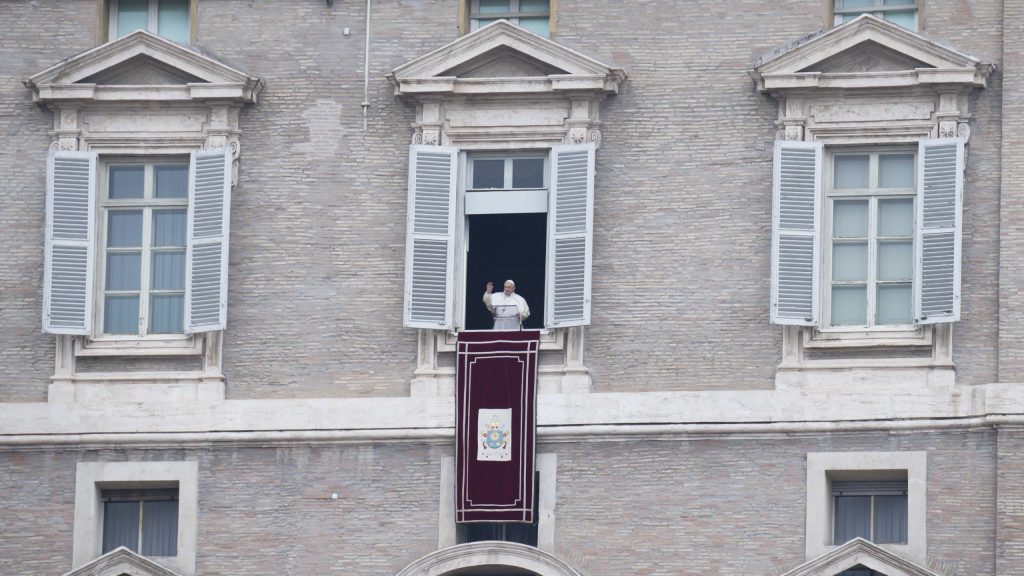Pope Francis said on Sunday that Christ’s Incarnation shows that God wants to live with us and in us.
Speaking at the Angelus on Jan. 2, he described Christmas as an invitation to see the world from God’s perspective.
“Dear brothers and sisters, often we keep our distance from God because we think we are not worthy of him for other reasons. And it is true. But Christmas invites us to see things from his point of view,” he said.
“God wishes to be incarnate. If your heart seems too contaminated by evil, if it seems disordered, please, do not close yourself up, do not be afraid: he will come. Think of the stable in Bethlehem. Jesus was born there, in that poverty, to tell us that he is certainly not afraid of visiting your heart, of dwelling in a shabby life.”
In his live-streamed address, Pope Francis reflected on the day’s Gospel reading, John 1:1-18, which proclaims that “The Word became flesh and dwelt among us.”
He said: “And this is the word: to dwell. To dwell is the verb used in today’s Gospel to signify this reality: it expresses a total sharing, a great intimacy. And this is what God wants: he wants to dwell with us, he wants to dwell in us, not to remain distant.”
The pope looked tired but spoke vigorously as he delivered his first Sunday Angelus address of the new year, departing frequently from his prepared text to drive home his points.
He was speaking after a busy liturgical period that began with Midnight Mass at St. Peter’s Basilica on Dec. 24 and included his “Urbi et Orbi” address on Christmas Day, as well as an Angelus address on Dec. 26 and a general audience on Dec. 29.
He preached but did not preside at a prayer service on New Year’s Eve. His first public act of 2022 was to offer Mass for the Solemnity of Mary, Mother of God, followed by the Angelus.
Speaking on Sunday, the pope suggested that the famous words from the opening of St. John’s Gospel contained a paradox.
“They bring together two opposites: the Word and the flesh,” he said.
“‘Word’ indicates that Jesus is the eternal Word of the Father, infinite, existing from all time, before all created things; ‘flesh,’ on the other hand, indicates precisely our created reality, fragile, limited, mortal.”
The pope said that these “two separate worlds” were united in Jesus.
“Faced with our frailties, the Lord does not withdraw. He does not remain in his blessed eternity and in his infinite light, but rather he draws close, he makes himself incarnate, he descends into the darkness, he dwells in lands that are foreign to him,” he commented.
“And why does God do this? Why does he come down to us? He does this because he does not resign himself to the fact that we can go astray by going far from him, far from eternity, far from the light. This is God’s work: to come among us.”
“If we consider ourselves unworthy, that does not stop him: he comes. If we reject him, He does not tire of seeking us out. If we are not ready and willing to receive him, he prefers to come anyway. And if we close the door in his face, he waits.”
“He is truly the Good Shepherd. And the most beautiful image of the Good Shepherd? The Word that becomes flesh to share in our life. Jesus is the Good Shepherd who comes to seek us right where we are: in our problems, in our suffering… He comes there.”
The pope challenged pilgrims to allow God to enter into “inner spaces” habitually denied to him.
“Today I invite you to be specific,” he said. “What are the inner things that I believe God does not like? What is the space that I believe is only for me, where I do not want God to come?”
He added: “Everyone has their own sin — let us call it by name. And He is not afraid of our sins: He came to heal us. Let us at least let Him see it, let Him see the sin. Let us be brave, let us say: ‘But, Lord, I am in this situation but I do not want to change. But you, please, don’t go too far away.’ That’s a good prayer.”
He also urged people to stop in front of nativity scenes during the Christmas period and “talk to Jesus about our real situations.”
“Let us invite him officially into our lives, especially in the dark areas,” he said.
After praying the Angelus, Pope Francis greeted pilgrims from Rome and further afield. He pointed out flags in the square below from Poland, Brazil, Uruguay, Argentina, Paraguay, Colombia, and Venezuela.
He also acknowledged pilgrim groups from around Italy, including young people who stand each Sunday in the square holding a pale blue banner with black text proclaiming “The Immaculate will triumph.”
The group, inspired by the spirituality of St. Maximilian Kolbe, has brought the banner to St. Peter’s Square for the Angelus since the 1990s.
Concluding his address, the pope said: ”On this first Sunday of the year, I renew to you all the Lord’s blessings of peace and good.”
“In joyful moments and in sad ones, let us entrust ourselves to him, he who is our strength and our hope.”
“And do not forget: let us invite the Lord to come within us, to come to our real life, ugly as it may be, as if it were a stable: ‘But, well, Lord, I would not like you to enter, but look, and stay close.’ Let’s do this.”

